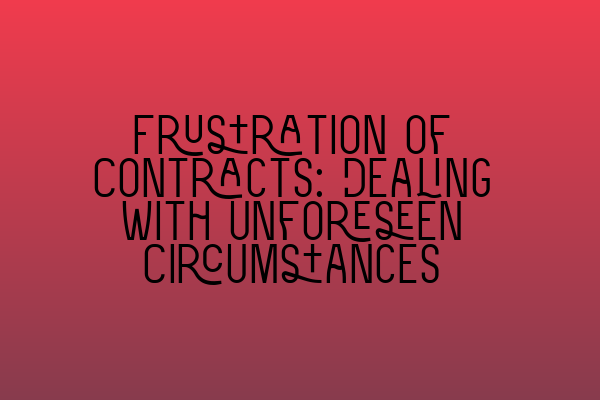Frustration of Contracts: Dealing with Unforeseen Circumstances
Contracts are an essential part of the business world, providing a legal framework that governs agreements between individuals or companies. However, there are times when unforeseen circumstances can arise, making it impossible or impracticable to fulfill the terms of a contract.
When such situations occur, frustration of contract comes into play. Frustration of contract refers to an event or circumstance that occurs after the formation of a contract, which renders it impossible or radically different to perform. In such cases, the parties may be relieved from their contractual obligations.
Understanding Frustration of Contracts
Frustration of contract is a legal doctrine that recognizes that there are circumstances where it is unfair to hold parties to their contractual obligations due to events beyond their control. These unforeseen events may include natural disasters, government actions, war, and other similar occurrences that fundamentally alter the nature of the contract.
When a contract becomes frustrated, it essentially becomes void. The parties are no longer obligated to perform their agreed-upon duties, and any monies or assets exchanged can be returned or repaid. Instead of being held to the contract, the parties are restored to their pre-contractual positions.
Proving Frustration of Contracts
Proving frustration of contract can be a complex process, as the burden of proof lies on the party seeking to rely on the doctrine. To successfully argue frustration of contract, certain conditions must be met:
- Unforeseeability: The event or circumstance that frustrates the contract must have been unforeseeable at the time of the contract’s creation. It should not have been within the reasonable contemplation of the parties.
- Supervening Event: The event must be a supervening event, meaning it occurs after the contract has been formed. If the event was already known or anticipated at the time of the contract, frustration cannot be claimed.
- Not Self-Induced: The party seeking frustration cannot have contributed to or caused the event or circumstance. If the party could have reasonably taken steps to prevent or mitigate the event, frustration will not be granted.
- Impact on Contractual Obligations: The event must render the performance of the contract impossible or radically different from what was originally agreed upon. Mere inconvenience or hardship will not amount to frustration.
It is important to note that frustration of contract is a high threshold to meet. The courts are cautious in applying this doctrine and will carefully consider the circumstances of each case before determining if frustration is applicable.
Legal Consequences of Frustration
When frustration of contract is established, the legal consequences include:
- Termination of Contract: The contract is deemed terminated from the date of frustration. The parties are no longer bound to fulfill their obligations.
- Return of Consideration: Any money, goods, or services exchanged under the contract can be returned or repaid.
- Quasi-Contractual Obligations: In certain situations, the court may impose quasi-contractual obligations to avoid unjust enrichment. This means that even though the contract is frustrated, one party may need to compensate the other for any benefits received before the frustration occurred.
Conclusion
Frustration of contracts is a legal doctrine that provides relief to parties when unforeseen circumstances make it impossible or radically different to perform a contract. It is important to understand the criteria that must be met to successfully argue frustration and seek relief from contractual obligations. If you find yourself in a situation where frustration may apply, it is advisable to seek legal counsel to assess the merits of your case and guide you through the process.
For more information on legal challenges and pitfalls in your practice, check out our article on Navigating Legal Challenges and Pitfalls in Your Practice. We also offer a comprehensive comparison between barristers and solicitors in our article Barrister vs. Solicitor: A Comprehensive Comparison. If you’re interested in finding your niche in the field of law, take a look at our article on Exploring Different Solicitor Specializations: Finding Your Niche. And for aspiring solicitors, we have a list of top recommendations for law schools in the UK in our article Top Recommendations for Law Schools in the UK. Lastly, if you’re interested in the rise of virtual law practices, don’t miss our article on Embracing the Rise of Virtual Law Practices.
